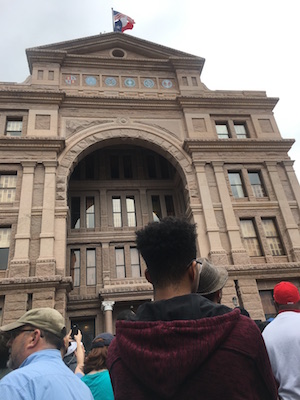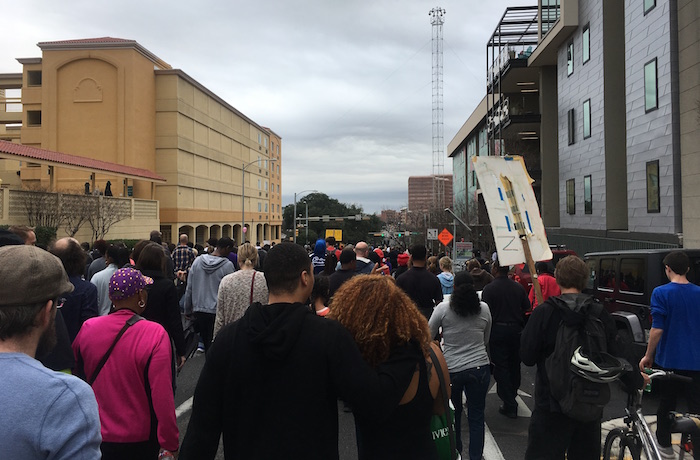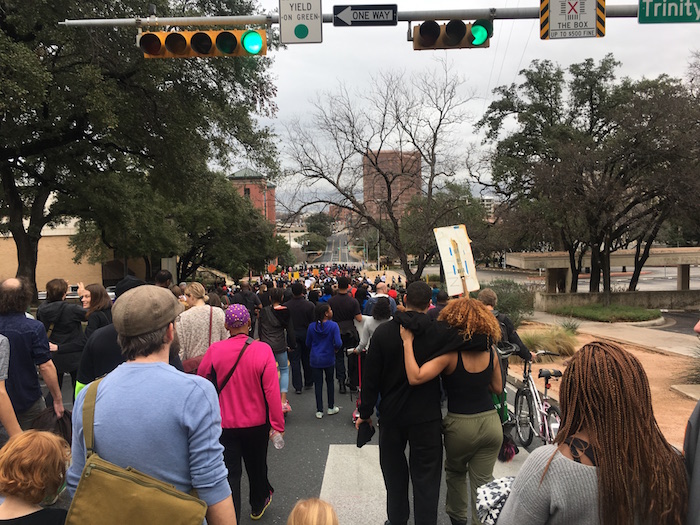Even though politics seems to be all anyone wants to talk about these days, it’s been hard to know exactly what to say. I’ve got drafts and drafts of half-finished pieces, all of them wrong. I intended to do an inaugural edition of my “How to Stuff a Donald Trump Piñata” (would you believe it’s 2016’s second most popular piece on my blog? And I wrote it in 2015!), but joking about stuffing copies of the Constitution, Russian nesting dolls, Beanie Baby kitties, and rainbow Skittles into a paper mache effigy just didn’t seem funny. So sad!
But today, I found the right words. Today, I realized that I needed to write about MLK Day to make sense of the Women’s March, two movements that encompass the full incendiary aspect of America’s toxically divided politics.

Checking My Privilege at the MLK March
A lot of people hate the phrase “check your privilege” and quite a few aren’t even sure what it means. I got schooled at Saturday’s MLK March.
Even though we’re festival hip and lifestyle cool, Austin is a very segregated city. Depending on the neighborhood, interacting with someone whose skin is a different color than yours can be rare. Martin Luther King Day is one of the few times when Austin’s Black community visibly comes together. My husband and I felt that, this January, more than ever, it was important to honor Dr. King and show our solidarity, so we walked downtown to join the march. We’d start out applauding marchers as they passed (honor) and then fall in with the tail end of the procession (solidarity) as people approached the Capitol.

As with many things, the idea and the doing didn’t exactly line up.
While we waited in the gray, misty morning, I became more and more agitated. There were few spectators and a worry bubbled up, nagging at me: What if some racists were protesting?
I nervously scanned the sparse crowd. We were the minority, and neither of us was wearing a supportive shirt or carrying a sign. We weren’t participating. How would anyone know I was a “good” white person? If bad actors showed up, how could I, some random white lady, avoid being lumped in with their negative message?
Would racist groups just assume I was supportive of their cause because of my color?
Safety Pins Won’t Fix This
If you’re a thinking person, life’s moments of clarity drop like pieces in a jigsaw puzzle. There’s a surety and satisfying click as the edges of ideas meet, a hole is filled, and the bigger picture suddenly makes sense.
That moment on Saturday at the march gave me the smallest taste of what it’s like to fear negative repercussions and perceptions due to the color of my skin. Now I had the piece I needed to explain those controversial safety pins. Remember the borrowed-from-Brexit “you’re safe with me” lapel craze?
The patronizing message behind those safety pins—that the wearer was a benevolent protector—rightly riled folks as a form of slacktivism, designed to fashion a feel-good moment from a lapel. Pinning an American flag on a suit doesn’t make a patriot, and there’s no literal equivalent to wearing your heart on your sleeve (though, my God, what I wouldn’t give to have Madeleine Albright’s jewelry box full of read-my-mood brooches).
Oh, but what that pin did provide was a tacit declaration to the world, “Please know that I am a good white person. Do not judge me by the color of my skin.”

That fear, that my skin color labels me as something wrongly assumed, it’s a new feeling for me, and I worried as the marchers rounded the corner leading to the Capitol. A friend, a white friend, called out from the procession and my husband and I joined in. Though at no point did I feel unwelcome, I felt other. I’ve never been so critical of my conduct, and I walked quietly alongside my neighbors. The crowd paused for speeches before proceeding—other than a few pleasantries exchanged with my friend, I spoke to no one and, beyond a few necessary crowd-related exchanges, no one spoke to me. There was a wariness.
What, like there should’ve been great rejoicing that a couple of white people showed up? Really, we’d just taken the literal next step beyond pinning on that safety pin.
The day, after all, wasn’t about me.
Sheltering Under Humanity’s Bigger Umbrella

This week is bookended with marches, and this, I think, must give the universe a secret pleasure. On Saturday, I’ll take part in the Women’s March on ATX, which—because everything about this political year has been divisive—has caused disagreement.
There’s the feminism thing (man haters!), the Black thing (privileged white feminists!), the conservative thing (liberal whiners!), the inaugural thing (sore losers!), and I’m sure about a jillion other “things” that skew interpretation away from where it needs to be: on this basic human right, equality.
As Hillary Clinton said so many years ago,
“Women’s rights are human rights.”
In the same speech, Clinton said, “As long as discrimination and inequities remain so commonplace everywhere in the world, as long as _____ and _____ are valued less, fed less, fed last, overworked, underpaid, not schooled, subjected to violence in and outside their homes—the potential of the human family to create a peaceful, prosperous world will not be realized.”
I omitted girls and women so you could fill in the blank with whatever noun you need. When you remove the divide, when the statement is allowed to accommodate everyone, it becomes truth for all. Space creates the bigger umbrella under which each of us who’d fill those blanks—be we women, men, Black, white, transgender, poor, uneducated, and a myriad of other things—can shelter together.
In this politically cantankerous year, those who champion equality have to put away divisiveness in all its forms. We can’t debate about whose rights are predominant or what rights deserve the limelight, because any disparagement opens the door to those who would deny. We must find the unifying haven where all marchers find safety.
In his most famous speech, Dr. King spoke of justice:
“We have also come to this hallowed spot to remind America of the fierce urgency of Now. This is no time to engage in the luxury of cooling off or to take the tranquilizing drug of gradualism. Now is the time to make real the promises of democracy. Now is the time to rise from the dark and desolate valley of segregation to the sunlit path of racial justice. Now is the time to lift our nation from the quicksands of racial injustice to the solid rock of brotherhood. Now is the time to make justice a reality for all of God’s children….
“But there is something that I must say to my people, who stand on the warm threshold which leads into the palace of justice: In the process of gaining our rightful place, we must not be guilty of wrongful deeds. Let us not seek to satisfy our thirst for freedom by drinking from the cup of bitterness and hatred. We must forever conduct our struggle on the high plane of dignity and discipline. We must not allow our creative protest to degenerate into physical violence. Again and again, we must rise to the majestic heights of meeting physical force with soul force.
“The marvelous new militancy which has engulfed the Negro community must not lead us to a distrust of all white people, for many of our white brothers, as evidenced by their presence here today, have come to realize that their destiny is tied up with our destiny. And they have come to realize that their freedom is inextricably bound to our freedom.
We cannot walk alone.
And as we walk, we must make the pledge that we shall always march ahead.
We cannot turn back.”
Today’s message lies in yesterday’s words: “Their destiny is tied up with our destiny.”
Equality must be everyone’s end goal or we can never achieve it. Dr. King recognized that working together toward a common destiny brought change. How would he lead us, a still divided America, now? Oh, I wish we had not been robbed of this man’s life—what could he have done with a lifetime to lift our country up to its greatest potential?

On Saturday, I will march mindfully, recognizing that I am not the most needful marcher. Knowing that I am not the most important marcher. Accepting that marching is a very small act in a struggle that requires great works. A struggle that, in fact, does not need to be about me. The struggle for equality is a whole, without division, and about us.
In his memoir and autobiography, Between the World and Me, Ta-Nehisi Coates writes eloquently to his son, Samori, whose name means “stuggle”: “We knew we did not lay down the direction of the street, but despite that, we could—and must—fashion the way of our walk. And that is the deeper meaning of your name—that the struggle, in and of itself, has meaning.”
On Saturday, I will fashion the way of my walk in Dr. King’s footsteps.

To read and hear these speeches, click on the titles:
Hillary Clinton’s 1995 United Nations Speech on Women’s Rights
Dr. Martin Luther King Jr.’s 1963 “I Have a Dream” Speech




Loved this, Leah. Really beautiful. I did not know it, but this is absolutely what I needed to help me organize my thoughts and emotions for Saturday\’s march. Thank you
Thank you for reading and the kind words. You know, our conversations this morning really helped me with my thoughts. We can solve the world over a run/walk and coffee!